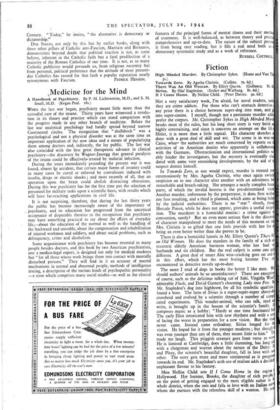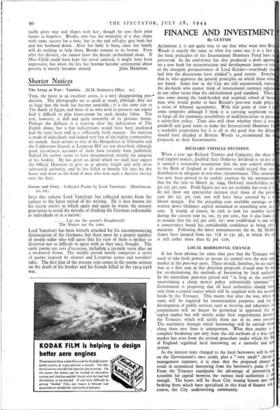Fiction
Towards Zero. By Agatha Christie. (Collins. 7s. 6d.) There Was An Old Woman. By Ellery Queen. (Gollancz. 8s.
If I Come Home. By Nellise Child. (Peter Davies. 9s. 6d.) NOT a very satisfactory week, I'm afraid, for novel readers, unl they are crime addicts. For those who can't stomach detection any price there is a choice between super-dog . into man, and into super-canine. I myself, though not a passionate murder ad prefer the corpses. Mr. Christopher Sykes in High Minded Mu breaks most of the rules, but his long short story is very brisk highly entertaining, and since it concerns an attempt on the life Hitler, it is more than a little topical. His character sketches done with a great deal of skill and wit. The scene is in war- Cairo, wher° the authorities are much concerned by reports on activities of an American dentist who apparently is collabora with the Germans. Obstructionism and international politics s ably hinder the investigators, but the mystery is eventually e dated with some very astonishing developments, by the aid of suspect dentist himself.
In Towards Zero, as one would expect, murder is treated ceremoniously by Mrs. Agatha Christie, who once again swit suspicion on to one character after another with an adroitness remarkable and breath-taking. She arranges a neatly complex ho party, of which the invalid hostess is the pre-determined vic Another murder, unforeseen by the perpetrator, is dont. first wi any fuss resulting, and a third is planned, which aims at being he by the judicial authorities. There is no " star " sleuth, the Hercule Poirot, while he does not appear, provides a useful insp tion. The murderer is a homicidal maniac: a crime against convention, surely? But an even more serious flaw is the distort of character manipulated to meet the needs of this moment or Mrs. Christie is so gifted that one feels peevish with her for being an even better writer than she proves to be.
There is also a homicidal lunatic in Mr. Ellery Queen's There W an Old Woman. He does the murders in the family of a rich eccentric elderly American business woman, who has had husbands and six children. But the real culprit is some one q different. A great deal of smart Alec wise-cracking goes on and in this effort, which has the most boring heroine I've encountered in detective novels up-to-date.
The more I read of dogs in books the better I like men. should authors' animals be so unsatisfactory? There are except: of course, such as the delicious talking cat of Saki, Virgidia W admirable Flush, and David Garnett's charming Lady into Fox. Mr. Stapledon's dog into highbrow, for all his symbolic qualities, found a bore. The hero of Sirius is a super-super-super shee crossbred and evolved by a scientist through a number of co cated experiments. This wonder-animal, who can talk, read write, is brought up in the bosom of the scientist's family. composes music as a hobby: " Hardy at one time fascinated The early Eliot intoxicated him with new rhythms and with a of facing the worst in preparation for a new vision. But the v never came. Instead came orthodoxy. Sirius longed for vision. He hoped for it from the younger modems ; but though was even younger than any of them, they meant little to him." made me laugh. This priggish creature goes from verse to w He is lionised at Cambridge, does a little slumming, has long with a clergyman and worries about the nature of the Deity: and Plaxy, the scientist's beautiful daughter, fall in love with other. The story gets more and more sentimental as it progr towards its end. Mr. Stapledon's arch use of realism adds a deci unpleasant flavour to his fantasy.
Miss Nellise Child sets If I Come Home in the region Hollywood. Her heroine, Brook; the daughter of rich PeoPle, on the point of getting engaged to the most eligible suitor in whole district, when she sees and falls in love with an Italian na whom she purSues with the relentless skill of a wanton. He et
tually gives way and elopes with her ; though he sees their joint future as hopeless. Brooke, who has the mentality of a slut, slums with some success for a time, but in the end self-pity gets both her and her husband down. After her baby is born, since her family will do nothing to help them, Brooke returns to its bosom. Even after her divorce, she cannot leave the decent ex-husband alone. If Miss Child could have kept her novel satirical, it might have been impressive, but when she lets her heroine become sentimental about
poverty it merely becomes absurd. JOHN HAMPSON.



























 Previous page
Previous page